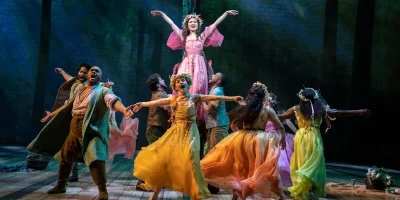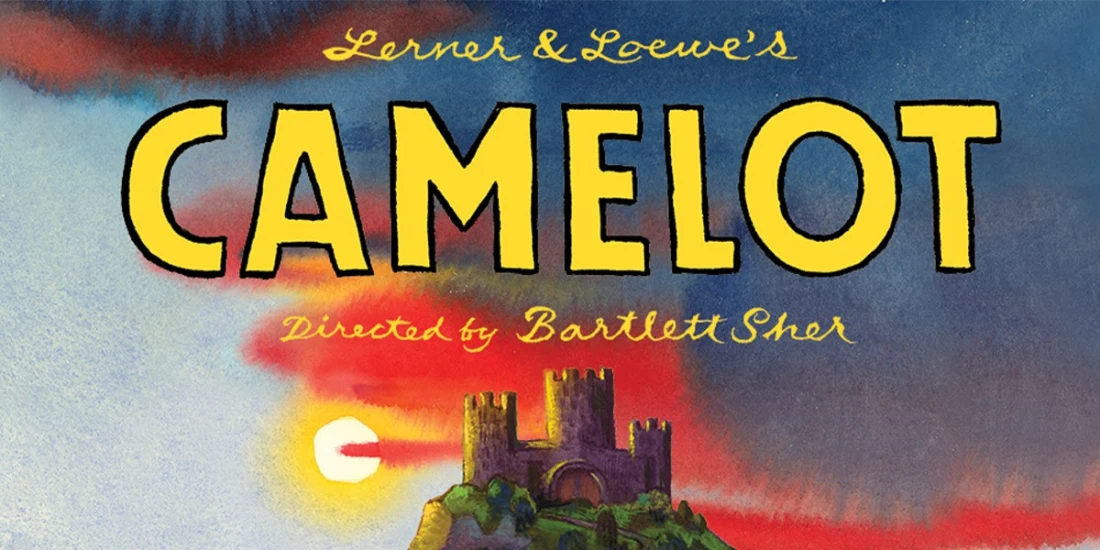
How the 'Camelot' Broadway revival is reinventing the roundtable
See why Lerner and Loewe's classic musical about an ancient mythical kingdom still speaks to modern times, thanks to updates by Oscar winner Aaron Sorkin.
Wonder what the king is doing tonight? Then hightail it to Camelot, the 1960 musical by Alan J. Lerner and Frederick Loewe that packs enough royal romance and drama to fill the Vivian Beaumont Theater, which houses the show's latest revival.
The show is based on the legend of King Arthur and the Knights of the Round Table. Nearly 63 years after premiering on Broadway, Camelot has carved its rightful place as a beloved classic. Credit a gem-packed score plus the enduring meaning of Camelot beyond the stage. Find out more about how Camelot looks to history and proves its lasting relevance, plus other compelling reasons to put this revival on your must-see list.
Aaron Sorkin updated the story.
This revival is not your grandmother’s Camelot. Since the beginning, the show’s sprawling story has been challenging to tell coherently. Director Bartlett Sher tapped Aaron Sorkin to update the book. Sorkin, who won an Oscar for writing The Social Network, a contemporary drama of power plays, brings the musical’s story down to earth while maintaining its epic sweep.
Sorkin scrapped Camelot's supernatural elements, so the stakes are all on a human level, and you can’t get higher than that. Plus, Sorkin situated the story on the eve of the Enlightenment. The poetic richness of that era speaks for itself, but this change also means Arthur is no longer in a fantasy bubble. His story now affects an actual period of history.
Camelot has a timeless takeaway.
Camelot is the mythical title kingdom that shone brightly, if briefly. Arthur goes from an idealistic young monarch who dreams of a just, democratic society to a despairing ruler who realizes his utopian visions have imploded.
A downer? Maybe. But Camelot’s brief rise is reason to rejoice – and to hope again for “a fleeting wisp of glory,” as the show famously says. Right now, a dose of optimism – and the reminder that greatness may be in anyone’s grasp – could do us some good.
Camelot is symbolic of the Kennedys.
One way to measure the reach of a musical is to look beyond the stage to its impact on pop culture. Camelot debuted on Broadway as John F. Kennedy was en route to becoming president. In the same way people know Arthur and his knights as chivalrous, they romanticize the Kennedy administration as a period of optimism.
“The Kennedys saw the show, and Jack loved it," Sorkin has said. "Jackie started calling their White House ‘Camelot.’” Today, it’s uncertain if that’s 100% true. But it’s the stuff of legend – and that’s what this musical is about.
Camelot showcases dramas of the heart and sword.
Love triangles and power battles are storytelling staples that don’t get old, and both are at the heart of Camelot. Despite her marriage to Arthur, Queen Guenevere becomes increasingly unable to resist her feelings for Sir Lancelot. That’s going to hurt. The king’s illegitimate son, Mordred, plots to overtake the throne. Ditto. These two events thread together and contribute to the demise of Arthur’s dream.
Camelot has a vibrant, celebrated cast.
The show’s principal roles now belong to a trio of proven Broadway talents. A Tony Award winner for The Inheritance, Andrew Burnap plays the idealistic Arthur. Hamilton Tony nominee Phillipa Soo is the conflicted Guenevere, and My Fair Lady alum Jordan Donica heats things up as Lancelot. Richard Burton, Julie Andrews, and Robert Goulet originated the three juicy roles.
Royal rubbernecking never gets old.
Royal intrigue is forever fascinating. The show offers this reminder on stage, and the coronation of England’s King Charles III in the lusty month of May (the 3rd, to be specific) provides one in the real world.
The musical’s songs are royal treats.
Lerner and Loewe’s score has many crown jewels. Among them are the buoyant title song and the jaunty “The Lusty Month of May.” “If Ever I Would Leave You” is hard to beat for sheer swoon appeal. Various artists like Aretha Franklin and Il Divo have covered the song.
You’ll hear an orchestra with oomph.
A royal epic deserves a lush background. This new production boasts a 30-piece orchestra and the show’s original orchestrations. When you have such beautiful songs, showcase them to the max.
The director is in his element.
Director Bartlett Sher, who previously collaborated with Sorkin on the Broadway play To Kill a Mockingbird, has lots of experience making classic musicals shine anew on stage at the Beaumont in Lincoln Center. He’s previously guided hit revivals of South Pacific, The King and I, and My Fair Lady on that grand stage.
Camelot is a Broadway time machine.
Camelot debuted in 1960 during the Golden Age of Broadway. Now, a new generation of theatregoers experiences the show with fresh eyes and ears. Today’s audiences get the best of both worlds: the pleasing nostalgia of a classic musical and a script by a celebrated contemporary writer. Together, they remind us that Camelot’s messages of hope, honor, and love outlast any kingdom.
Originally published on


